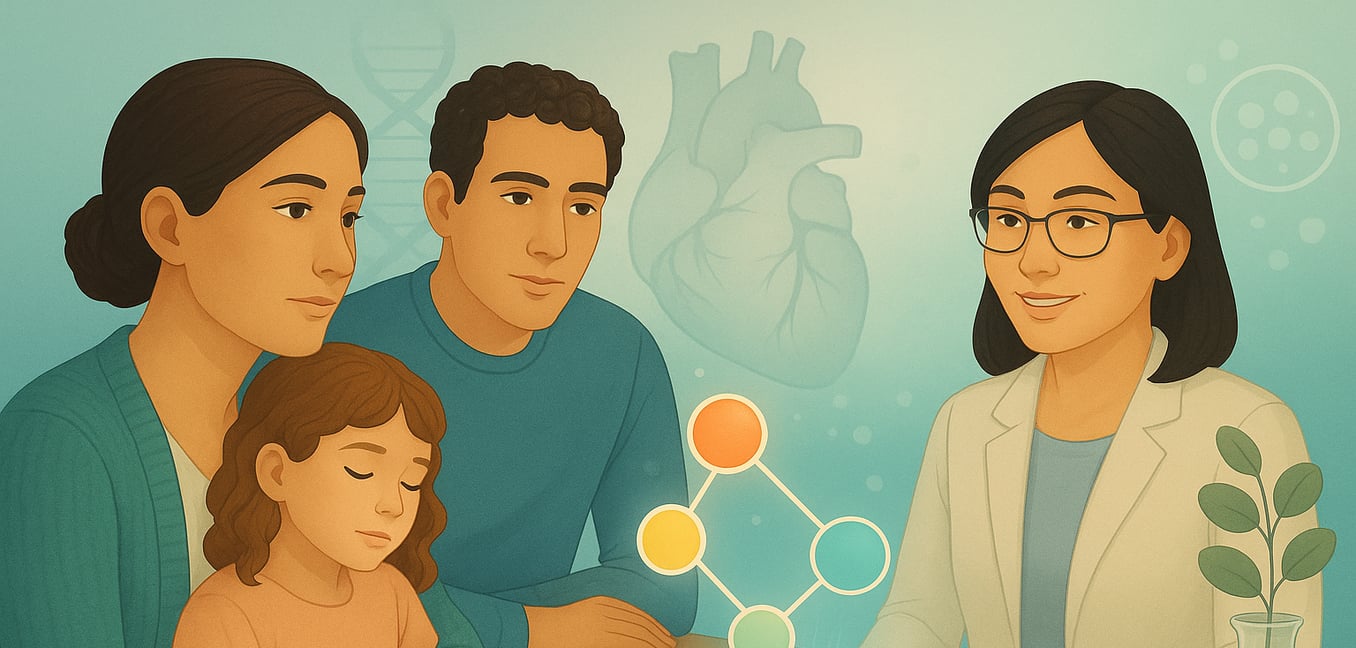Understanding Noonan Syndrome: A Concise Overview
Noonan syndrome is a genetic condition that affects development in various ways, arising from mutations in genes that control how cells grow, divide, and specialize84. These genes are part of a critical cellular signaling route called the RAS-MAPK pathway57. Think of this pathway as a chain of command; in Noonan syndrome, a mutation causes one of the "switches" in this chain to get stuck in the "on" position, disrupting normal development8.
While a single gene mutation is responsible in each person, over 20 different genes have been linked to the syndrome, explaining the wide variability in features among individuals73. The most common is PTPN11, found in about 50% of cases.
The condition is usually passed down in an "autosomal dominant" pattern, which simply means a child only needs to inherit one copy of the mutated gene from a single parent to be affected. An affected parent has a 50% chance of passing the condition to each child114. However, in about 60% of cases, the genetic change occurs spontaneously (de novo) in a child with no family history of the disorder10. For these families, the chance of having another child with Noonan syndrome is very low (less than 1%)9. The small remaining risk exists because, in rare instances, the mutation might be present in a small number of a parent's reproductive cells (sperm or eggs) even if it is not found in a blood test114.
The Central Role of the Genetic Counselor
For families navigating a new diagnosis, a genetic counselor is an essential guide and advocate11. They bridge the gap between complex genetic information and the realities of daily life, empowering families at every step of their journey11.
Providing Clarity and a Definitive Diagnosis
Genetic testing provides families with a clear answer, often ending a long and stressful "diagnostic odyssey" of visiting numerous specialists for isolated symptoms11. A definitive molecular diagnosis helps distinguish Noonan syndrome from other similar-looking conditions, such as Costello syndrome, each of which requires a unique management approach8.
A genetic counselor translates these test results into understandable terms113. They explain what a specific mutation in a gene like PTPN11 or RAF1 means for a child’s health, demystifying scientific concepts and empowering parents to ask informed questions and feel more confident when speaking with other medical providers11.
Navigating the Emotional and Psychological Impact
A genetic counselor provides a safe, non-judgmental space for families to process the wide range of emotions that can accompany a new diagnosis, from confusion and anxiety to relief at finally having an answer113. They listen to a family’s concerns, validate their feelings, and help them develop coping strategies for the journey ahead11.
Beyond emotional support, counselors act as powerful advocates for the family within the healthcare system11. They can help coordinate appointments with specialists, ensure the family's questions are addressed, and connect them with valuable resources such as the Noonan Syndrome Foundation or local parent support groups, so they never feel like they are navigating this path alone84.
Assessing Family-Wide Risk and Inheritance
One of the first steps after a diagnosis is to understand its origin11. A genetic counselor will coordinate testing for the parents to determine if the mutation was inherited or if it occurred de novo10. This information is crucial, as it clarifies the risk for future pregnancies and can lead to the diagnosis of other family members who may be so mildly affected that they are unaware of their condition, ensuring they also receive appropriate medical follow-up10.
Empowering Informed Family Planning
The core philosophy of genetic counseling is non-directive, meaning the counselor’s role is to empower families to make decisions that align with their own values and beliefs11. For parents who know they carry a Noonan syndrome-associated mutation, a counselor will lay out all available reproductive options without recommending a specific course of action114.
These options may include prenatal diagnosis during a future pregnancy, using techniques like chorionic villus sampling (CVS) or amniocentesis to test the fetus for the specific familial mutation94. Another path some families choose is preimplantation genetic testing (PGT), which involves using in vitro fertilization (IVF) to test embryos for the mutation before one is selected for transfer114. The goal is to ensure that every choice the family makes is fully informed and feels right for them11.
Putting Knowledge into Action: Managing Noonan Syndrome
A definitive genetic diagnosis marks a pivotal shift from uncertainty to empowerment11. It serves as the foundation for building a proactive and comprehensive strategy for managing health and supporting development11.
Building a Multidisciplinary Care Team
A cornerstone of effective management is creating a team of specialists who understand the complexities of Noonan syndrome. This team often includes:
- A cardiologist to monitor heart health
- An endocrinologist to oversee growth and puberty
- A hematologist to address potential bleeding issues
- Developmental specialists to support learning and motor skills
The genetic diagnosis provides a unifying framework for this team, ensuring that care is coordinated and that each specialist is aware of how their area of focus fits into the bigger picture.
Proactive Health Monitoring Based on Genotype
The diagnosis allows for a shift from reacting to symptoms to proactively monitoring for potential complications8. For instance, knowing that mutations in the RAF1 gene carry a higher risk for hypertrophic cardiomyopathy prompts more frequent cardiac monitoring, even if a child’s heart appears normal at diagnosis.
Similarly, certain genetic variants are linked to a very small but manageable increase in the risk for a blood disorder called JMML57. Knowing this allows doctors to recommend simple, routine blood tests during early childhood as a precaution, ensuring any issues can be caught and managed early4. This targeted surveillance helps prevent unexpected complications and provides peace of mind8.
Supporting Holistic Development and Well-being
An effective management plan extends beyond medical appointments to encompass the child's overall quality of life7. Many children with Noonan syndrome benefit from early intervention services like physiotherapy, occupational therapy, and speech therapy to help them meet developmental milestones85. Recognizing that learning differences or anxiety can be part of the syndrome, the plan should also include access to educational psychologists and mental health support7. This holistic approach ensures the child is supported not just physically, but also socially and emotionally, empowering them to thrive11.










